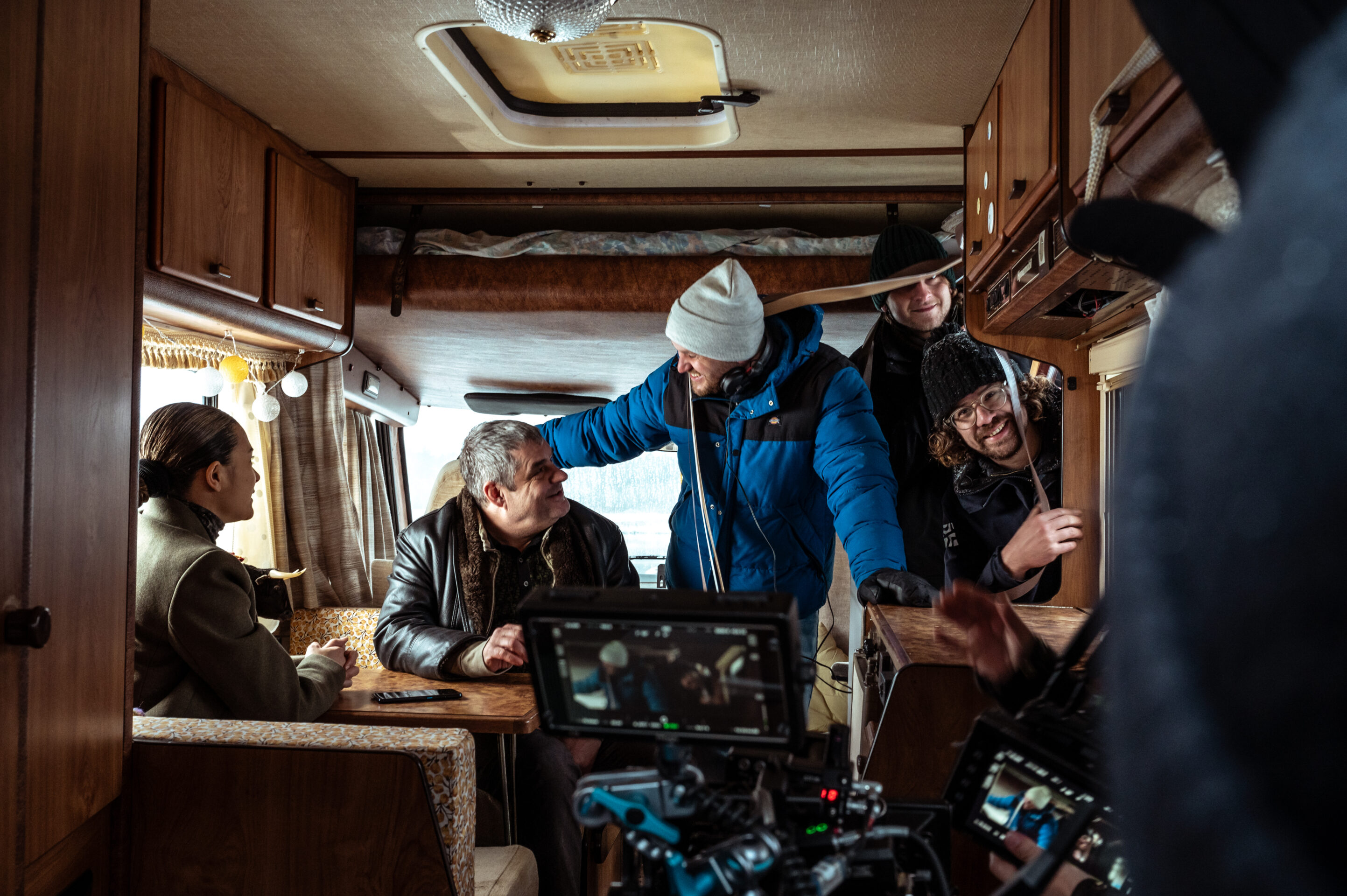In a yellowed old camper on Bosduifstraat, three nervous-looking young people sit beneath the harsh fluorescent glow of a cheap lighting fixture. There’s a gun on the table between them. It’s raining outside, each drop pinging the tin roof loudly and adding to the tension in the trailer. Words are being had, voices are raised and soon a scuffle breaks out. Someone reaches for the gun. And then –
“Cut!”
There is no ‘Bosduifstraat’ in Herselt, near Antwerp, despite the sign hanging on a wooden picket fence erected just outside the trailer. The abandoned camping park in this town, where road placards warn that visitors will be stepping outside the range of cell service, is just one of the sets of Netflix’s upcoming film Ferry 2, the sequel to an already successful flick that itself is a spin-off from the hit TV series Undercover.
In the television series, Belgium’s beloved Tom Waes stars as an undercover police officer embedded in the drug world run by kingpin Ferry Bouman, played by Dutch actor Frank Lammers.
People have referred to the show as a ‘Belgian Breaking Bad’, but while the similarities are there (gritty realism, ugly truths and well-timed humour), it is a distinctly Low Countries creation.
Ferry is set in both Belgium and the Netherlands, and the cast’s wide range of accents reflects the reality on the ground as anyone who’s ever been to or lived on the border would know it. It’s a hodgepodge of cultures, rivalries, and different ways to roll your Rs. The authenticity is its draw: the kermis (or fun fair) Ferry visits, the food his mother makes, the music playing in the car, the language spoken – it’s all plain reality to Belgian and Dutch viewers.
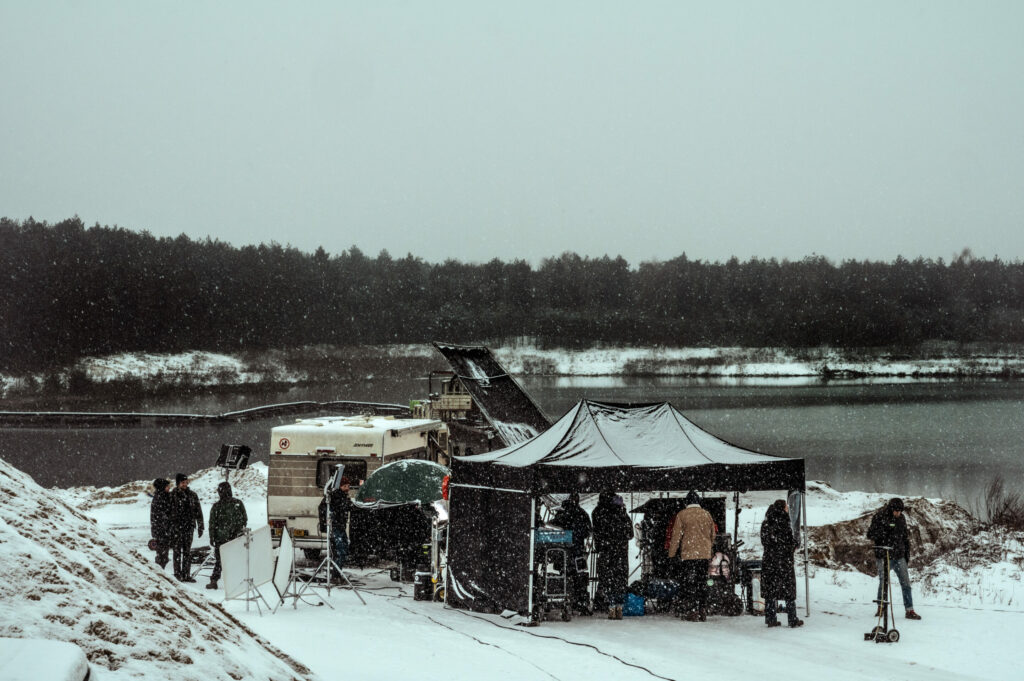
Shooting Ferry 2
But if anyone arriving at the film set in Herselt were looking for the standard icons of Hollywood glamour such as personalised dressing-room trailers, an army of personal attendants and on-demand shrimp scampi, they’d drive right past the small site where the Belgian-Dutch film crew has set up camp in an old dance hall.
There are tables with ingredients for making broodjes: bread, cheese, hagelslag, mayo. A few directors’ chairs are posed in front of worn mirrors, but none are emblazoned with names, even though one is for the award-winning Lammers, one of the Netherlands’ most prominent figures in entertainment. The screen industry is a humble one here, where Tom Waes – possibly the most famous actor in Belgium – can often be spotted driving himself through Antwerp or dining at ordinary restaurants without fuss.
Incredibly talented, but you won’t find either man gracing the cover of GQ, oiled and shirtless.
“I have the feeling that we’re not so focused on classical beauty,” says Belgian director Cecilia Verheyden. “We’re much more used to character faces. Frank Lammers, to me, has the most amazing face to put a camera on. But not in America, no. There he’d be more of a side character. The main character will always be a beautiful person. We pay less attention to that here.”
Verheyden directed the first Ferry film and some of the first season of the television series. She also co-directed and was the showrunner for the Netflix series Rough Diamonds (2023), set in – where else? – Antwerp.
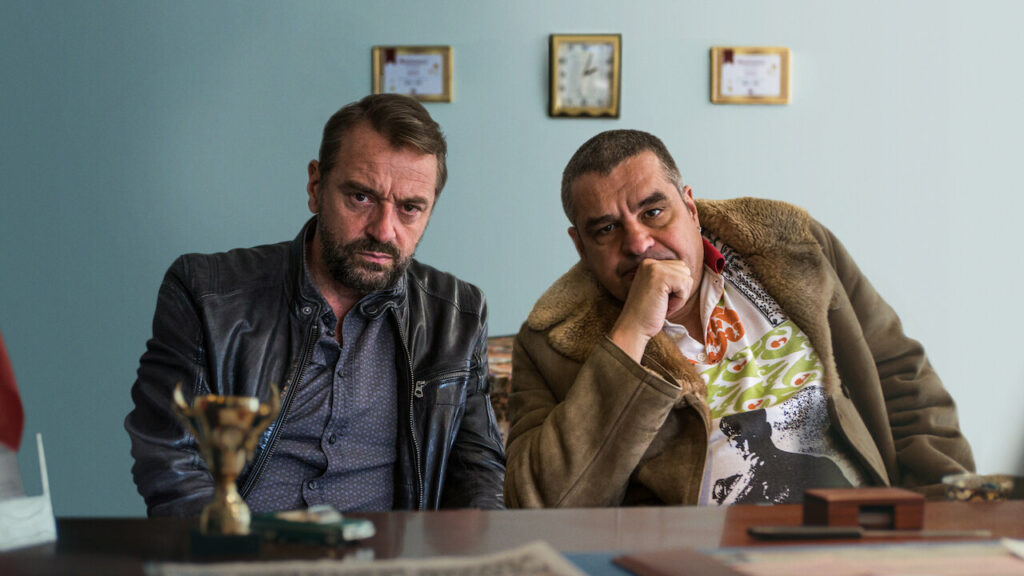
A scene from Undecover.
Global audience, big ambition
In the Belgian screen industry, Verheyden says, they care about character, not cover spreads, and it’s reflected in the shows and films starring people who don’t look wholly unlike your next-door neighbour.
“These people are beautiful, but not in a classical way,” she says. “Our actors aren’t afraid of being or playing ugly, and that’s a big difference. After making Ferry, I got a lot of contact from American producers, industry people, and what they loved about the series was the nuance – in American dramas so often people are good or bad. They would say to me, ‘How can you make me fall in love with Ferry when he’s the most horrible character?’”
But while Belgian (and Flemish, and Dutch) film and television stands often in stark contrast to Hollywood, it has changed since the arrival of the American entertainment giant. It’s getting far more professional, Verheyden and other directors note. A streaming service like Netflix means the content they produce can play in living rooms and on laptop screens quite literally around the world (Spain’s La Casa de Papel remains one of Americans’ beloved ‘pandemic shows’, binged during lockdowns).
“It raises the bar,” explains Belgian-Dutch director Nico Moolenaar, who created Ferry and Undercover. The character of Bouwman was loosely based on real Dutch drug trafficker Janus van W., who, in an instance of life imitating art, turned himself in to police as ‘Ferry’ after the series debuted.
Moolenaar recently secured a creative partnership deal with Netflix to produce a series called Amsterdam Empire, slated for 2025 and featuring Dutch entertainment heavyweights Famke Janssen, Elise Schaap (who fans will recognise from Ferry and Undercover) and Jacob Derwig.
Moolenaar has seen the effect firsthand of a major player like Netflix moving into the previously somewhat sleepy screen industry here.
“What Netflix brings to the table is a global audience and a big ambition,” he says. “They’re not afraid to invest in local content, so they invest heavily in our shows, which helps our industry. Undercover couldn’t have been made without Netflix – or, it could have, but with half the budget, since it was a co-production with VRT.”
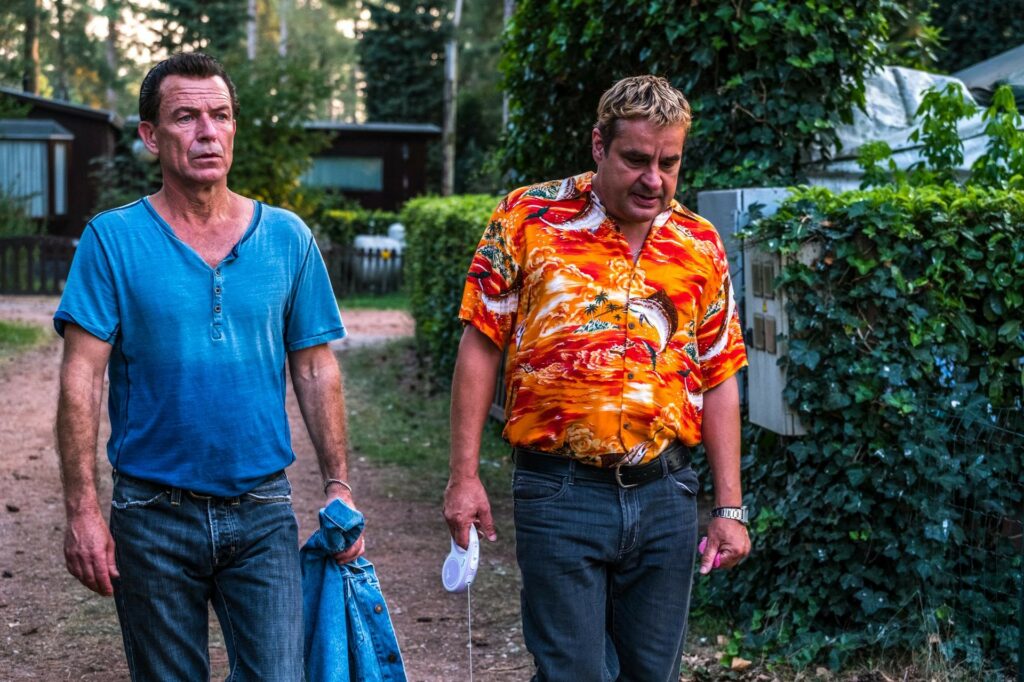
A scene from Ferry.
Moolenaar remembers the early days of Netflix’s arrival in the region, when everyone was scrambling to be the first local show the American mega-corporation produced. “Although I wasn’t looking for it – because with so many other people wanting it, too, it seemed unlikely – our script ended up on the right desk. They hadn’t seen anything like it yet. They wanted it.”
But what Netflix didn’t want, Moolenaar says, is to meddle. “They’re more hands-off when it comes to detailed notes. There’s no one-size-fits-all, like how the older production companies did it: top down, what we say goes. Here, they’re looking at every project and situation in a different way. It’s a smart strategy of saying, ‘We see what you’re doing, we trust you, please continue doing that.’”
It’s more or less the same way that Netflix runs internally: hire the best talent, then trust them. The model has been the subject of more than one business book, but the results of applying it to film and television production are much sexier.
Local language, local storytelling
“When we talk with our creative partners about what success looks like, its: entertaining, thrilling, great storytelling,” says Larry Tanz.
Tanz is Netflix’s VP of content for the Europe, Middle East and Africa region (EMEA), which happens to be Netflix’s largest. He oversees all EMEA programming, including hits like Lupin (France), The Empress (Germany), La Casa de Papel (Spain), Troll (Norway), All Quiet on the Western Front (Germany again), Love Never Lies (Poland) and Young, Famous & African (Africa) – just to name some of the bigger ones.
“Our whole focus – our thesis, if you will – is that we can tell great local stories that appeal to local audiences. We’re doing that kind of simultaneously and parallel across 11 different areas, making stuff from 22 to 23 countries.”
That local appeal is the second most important factor to great storytelling, he says. “Local language, local storytelling, we’ve found that this works. A French writer writing in French, working with execs in French.”
It didn’t used to be that way, Tanz recalls: “It’s been a journey. We used to, even when I first came here, commission out of the US. Everything was still in English, including production. Everyone just had to deal in English. Now we’re local teams in the local language. We’ve built relationships. Netflix Belgium is just great creative minds and programmes from Belgium – more ‘Belgian’ than ‘Netflix’.”
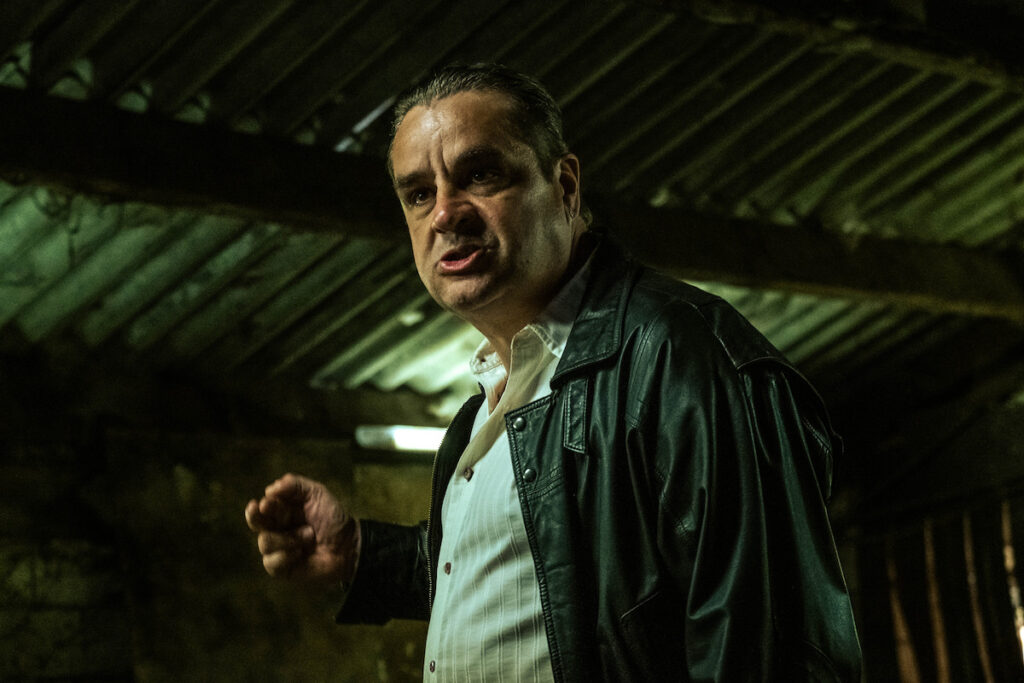
A scene from Ferry.
But Ferry’s blending of countries and cultures is unique. A movie about the Germans, made in France? No. An international cast to tell a multicultural version of a Norwegian story? Those pitches (and they’re made often) get a hard pass from Netflix.
“We get pitched big IP (intellectual property) but people want to make it in English, even if it's a big French or Italian IP,” Tanz says. “Why would we do that in a different language? The audience values seeing the story in their language. That authenticity is what makes it interesting to people from other parts of the world. Squid Game was made for a Korean audience. There’s not one line or scene in there made with the idea of, ‘Let’s get people in the US or Canada to watch it.’”
Netflix wants Spanish stories for Spain, Italian ones for Italy, and Belgian ones for Belgium. It’s just that in the case of Belgium and the Netherlands, whose semi-shared language (asserting that Flemish is or is not the same as Dutch will spark an argument either way) is just one of many factors that bind them, there is a natural bleed-through. And, to use Tanz’ own words: it works.
Heroes and gangsters
Undercover’s first season was the most watched show in the Netherlands when it was released in 2019. But its story of heroes and gangsters also struck universal chords, landing the show a place in Netflix’s top global viewing list. Fans were found everywhere from France and Malta to Argentina and Trinidad and Tobago.
Verheyden doesn’t pay much mind to international eyes, though. “I just try to be as authentic as possible, and authentic for me is Flanders,” she says. “I don’t think: how is the rest of the world going to look at our country, our people? I don’t think about that when I’m making a show. But I do think about how, during the pandemic, the only way for people to ‘travel’ was by watching series like these – like Ferry and Rough Diamonds. When Ferry goes to the fun fair and is eating burgers and listening to music, of course that’s Flanders, that’s the Netherlands. I’m showing my country to the rest of the world.”
The local ingredient is critical: Netflix has partnered with over 400 independent producers over the last half-decade to produce stories that embody the heritage of their country of origin – whether set in a rural town like Poland’s Highwater or the Parisian backdrop of Lupin.
The sheer reach of productions has created global celebrities (Society of the Snow’s Oscar-nominated Enzo Vogrincic saw his Instagram follower count skyrocket from 8,000 to over a million after the film’s debut); boosted book sales (Lupin is based on a book and post-production sales far surpassed its debut); and even increased tourism (France’s national cinema body said 80% of the foreign tourists to visit the country’s capital last year did so because they saw Emily in Paris or Lupin).
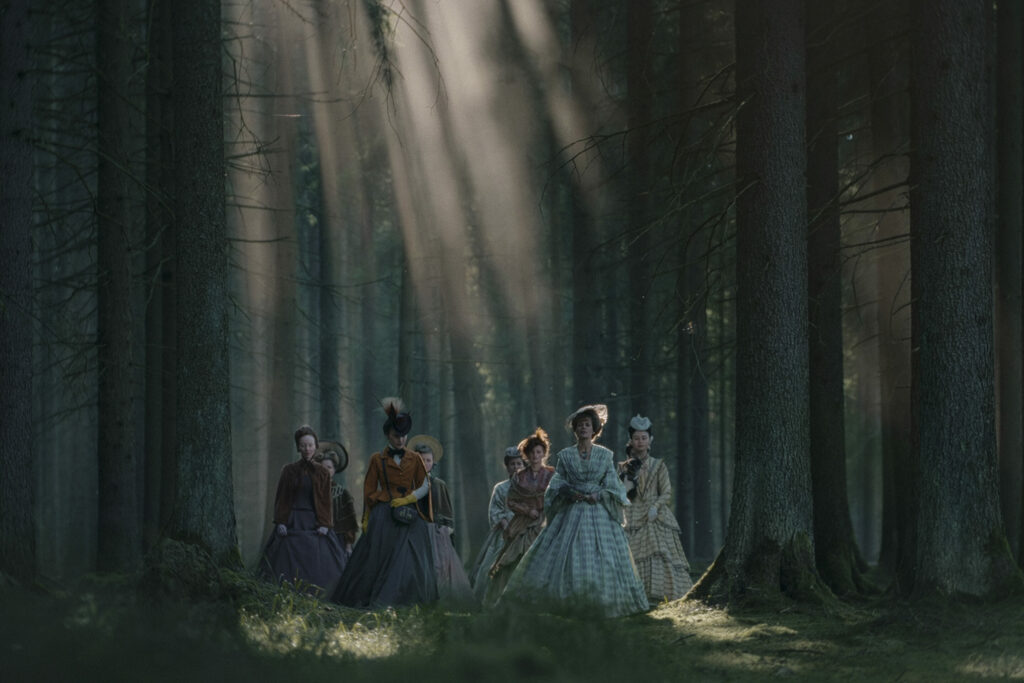
A scene from The Empress (Die Kaiserin). Credit: Netflix
But Ferry’s universe spans two countries
Pieter Van Huyck, head of content strategy for De Mensen, has been working in partnership with Netflix for some time now, and with the Ferry universe since day one. Naturally, he’s on the film set in Herselt, keeping an eye on production and the weather (they’d prefer it to be raining, so of course it’s not, for once).
“We didn’t make a border story to make a border story. There’s no ‘artificial construction’ in this,” he says.
“I think if you do it right, after half an episode, the viewer doesn’t even notice anymore which character is Dutch and which character is Flemish. When you create something and it becomes a success, it’s easy to afterwards tell everybody you were simply brilliant. But that’s not how creativity works.”
How does it work? Trial and error. Hard work. “You have to believe the world you watch, and its characters. And then you tell an exceptional story.”
Role of a lifetime?
Ferry himself is an easy character to believe when played by Lammers. The award-winning actor (Best TV Actor, Best Supporting Actor, armfuls of international festival awards, five-time nominee for the prestigious Golden Calf and oh – he also happens to be well-decorated director, too) sits on a chipped wooden bench in the abandoned dance hall. It’s chilly, but there’s no heat, so people are wearing their jackets indoors.
“Some of my best work, almost no one has seen,” Lammers says. “I’ve made very nice movies for 30 years. They’d put up two posters and then hope someone watches. I’d say, ‘Come on, how about at least two different kinds of posters?’ and it’d be ‘No, no, then we aren’t targeting the right group.’ But what ‘right group’? We want everyone to watch it! No one ever believed me, and then Netflix came, and they are very, very good at that. They’ve professionalised the marketing.”
Ferry has reached audiences so wide, Lammers has been recognised in American grocery stores when vacationing now. It’s different there – the celebrity culture around screen stars – and perhaps a little uncomfortable for a heavy-hitter in Dutch and Belgian film and television.
“I never decided to be an actor,” Lammers confesses. “I never made plans.” It’s a little strange sitting so close to him while he’s still dressed as the film’s titular character. While creator Moolenaar explains that all the universe’s characters ‘have two faces’, one much softer than the other, Ferry Bouman’s second face is that of a ruthless, violent criminal.
“When people ask, ‘Is this the role of your lifetime?’, I say, I hope not, because then I’m done.” Ferry – Lammers – laughs. “‘What’s your best part?’ My next one. If you stay open like that, life happens.”
Ferry 2 is slated for release later this year, but anyone looking to explore the show’s universe now can find three seasons of Undercover and the first film, Ferry, on Netflix. Looking for other Belgian content? Here’s what’s streaming: Knokke Off, Into the Night, Noise, Rough Diamonds, The Claus Family.
Lites, Camera, Water
The most advanced underwater film stage on the planet is right in the heart of Europe’s capital. Not all film production in Belgium takes place in off-the-grid forests or abandoned campsites. Just outside the Brussels beltway is the world’s most advanced interior water stage, Lites Studios.
For films needing dramatic underwater scenes, depictions of dangerous ocean rescues, or shots of ships capsising in a storm, this Belgian studio offers it all: waves up to a metre high; water FX like rain, wind, and water canons; a set that can be tilted, submerged or flooded eight metres; and a moveable pool floor for dry set construction.
Apart from professional crews trained in underwater and surface shooting, Lites deploys construction divers and safety divers, along with specialists in underwater actors coordination and water training for actors.
From major motion pictures like Netflix and BBC Films’ Luther the Fallen Sun to Rammstein’s music video for Zeit, if a project needs an underwater shot, bags are often packed for Brussels. Netflix Poland is using the set for Heweliusz, set to debut in 2025 from the creative team behind the successful Polish series Highwater.
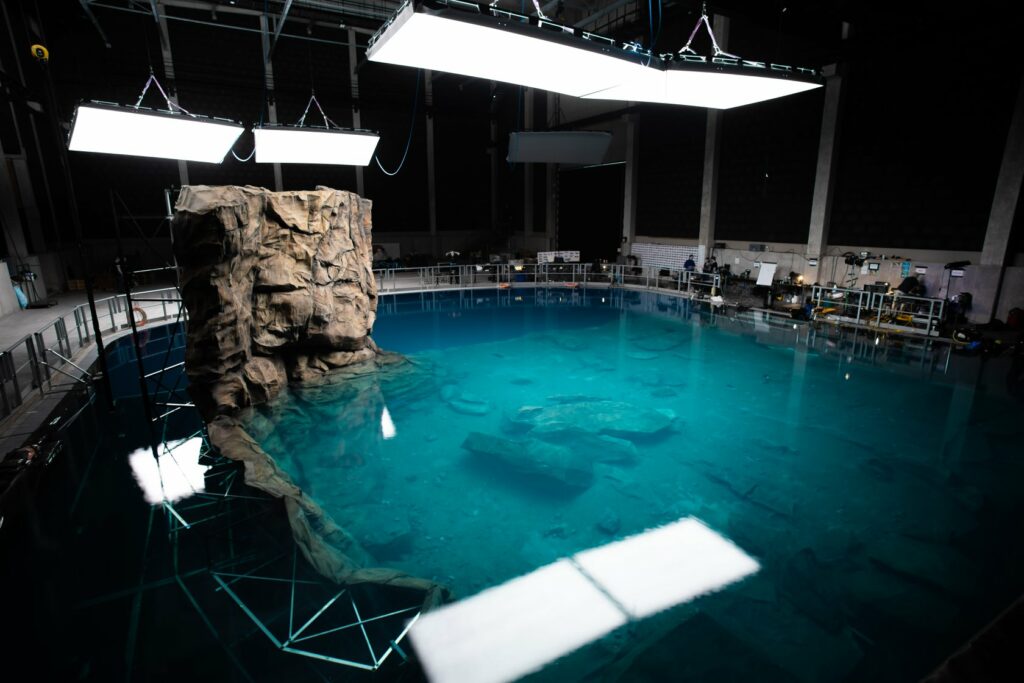
Lites Studios in Vilvoorde.

